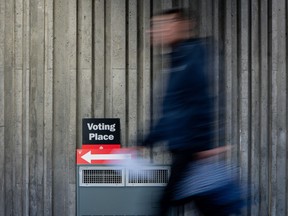There are still around 49,000 votes that need to be tallied and that will occur over the weekend of Oct. 26-28

Article content
In the 2024 British Columbia provincial election, just over two million people cast their vote — setting a record.
The result, however, remains unclear, with some races so close they will need to be recounted before it is known if the B.C. NDP or B.C. Conservative parties have won the required 47 seats to govern, or if the B.C. Greens hold the balance of power.
This is how the recount process works:
Advertisement 2
Article content
There are two voter tallies performed by Elections B.C.
The first is the initial count and comprises the vast majority of all votes cast. This includes votes made on election day (Oct. 19), votes cast in advance, votes cast at electoral district offices and vote-by-mail ballots received by Oct. 17.
These are the numbers seen posted live and are generally known by the end of election day.
After the initial count, there are still around 49,000 votes that need to be tallied and that will occur over the weekend of Oct. 26-28. Those votes include mail-in votes received after the close of advance voting and absentee ballots cast by out-of-district voters at some voting places.
On Sunday, based on the initial count the B.C. NDP won or were winning in 46 ridings, the B.C. Conservatives in 45 and the B.C. Greens in two.
However, two of those races were so tight they will need to be recounted because the margin between the two main candidates was less than 100 votes. These ridings are Surrey City Centre, where the B.C. NDP candidate leads by 96 votes, and Juan de Fuca-Malahat, where the B.C. NDP candidate leads by 23 votes.
Article content
Advertisement 3
Article content
These district electoral officer recounts will take place during final count next weekend and will include any final count votes. Under the Election Act, recounted ballots are counted manually, by hand.
But it doesn’t end there.
Once the final votes are counted a district electoral officer must apply for a judicial recount if there is a difference between the first two candidates of less than 1/500th of the total ballots considered (0.2 per cent). Judicial recount requests must be made within six days of the conclusion of final count.
University of British Columbia political scientist Stuart Prest points out that there are two other ridings that have a vote difference of close to 100 and these could also be recounted if final count votes brings that number down to 100 or less, or reach the 1/500th milestone.
These are Kelowna Centre, where the B.C. NDP candidate has 148 more than their rival, and Surrey Guildford, where the B.C. Conservative candidate has 105 more votes than their rival.
Prest notes that 49,000 votes translates to 526 votes per riding on average, so it is possible that these votes could trigger judicial recounts.
Advertisement 4
Article content
According to Elections B.C. at the conclusion of the initial count, voter turnout was estimated to be 57.41%. This is up from the last B.C. election in 2020, in which 53.86 per cent of registered voters cast a ballot. As of the close of the initial count, 2,037,897 ballots have been cast, the most ever in a provincial election in B.C.
The previous record was 1,986,374 votes cast in the 2017 provincial election.
Recommended from Editorial
RACE FOR B.C.: Follow our coverage of the 2024 B.C. election campaign HERE. Not yet a subscriber? Please click HERE for a special subscription offer.
Article content




Comments